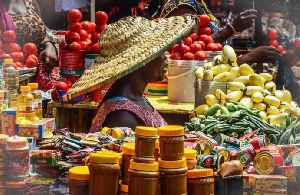The Ghanaweb on Thursday 19 August 2010 reported the commissioning by the Minister for Food and Agriculture, Mr. Kwesi Ahwoi, of rehabilitated laboratory for the University of Cape Coast School of Agriculture. The Minister was quoted as lamenting that the project had taken unnecessarily 7 years to complete, explaining that the contract for the work was first awarded in 2003 to one company but was terminated in 2005. Despite this, the contract was re-awarded to the same company the same year but was again terminated in 2007 for non-performance.
According to the Minister, the saga illustrated the “sloppiness with which we execute most contracts in the country when we award contracts on the grounds of patronage rather than competence.” He went further, expressing concern that the “neglect by successive governments of uncompleted projects [w]as a worrying phenomenon in Ghana.” He lamented that in spite of Article 35(7) of the 1992 Constitution, which required governments to “continue to execute projects and programmes commenced by the previous administration that provision was not being adhered to,” pointing out that “often politicians ignored that provision in pursuit of their politically parochial, biased and disjointed developmental agenda and abandoned very important projects because they were unrestrained by any enforcement mandate.”
The Minister’s concerns, in my view, raised fundamentally important and wider questions as to whether successive governments of Ghana have not failed to approach our national development and implementation in a planned and strategic manner. In light of past three decades’ experience, should we continue to leave national development planning in the hands of the governments of the day, to do as they please?
The purpose of this piece is: (a) to try to identify some of the factors that appear to contribute to the situation bemoaned by the Minister; (b) to propose a radically new approach to setting and implementing our national development goals in future; and (c) to invite constructive public debate focussed on the Minister’s concerns, and the possible solutions I shall propose at the end of this piece.
Let me begin with the Minister’s concern that the provisions of Article 35(7) lack teeth. His reading of Article 35(7) is correct, except that the framers of our Constitution never intended those provisions to have teeth in the first place. This is evident from prefaced words “as far as practicable”. The framers appear to put trust in the goodwill and integrity of our ministers to make impartial and apolitical decisions regarding projects commenced by outgoing governments. Experience has shown, however, that our politicians do not have an awful lot of goodwill and integrity. A new minister who is determined for whatever reason not to continue implementation of an existing project could very easily muster a million reasons why it was not “practicable” to do so. And that would be the end of the matter, unless of course the president ordered otherwise. Two options seem open to us. We could amend Article 35(7) and other relevant provisions of the Constitution to put teeth into them. But that is highly unlikely. Alternatively, we could find ways outside our Constitution to address the Minister’s immediate concerns and the wider questions.
Our political parties and politicians wake up every four years when presidential and parliamentary elections fall due and suddenly become aware that the Ghanaian masses are facing serious social and economic problems. That is the time when they work themselves to death, criss-crossing the length and breadth of Ghana in their shiny 4x4s promising everything under the sun: from eradication of poverty and disease, more money in our pockets, to “affordable” new homes for everyone. The sky is the limit. The harsh reality, however, is that nothing much happens here on earth after the elections. In fact, they promptly go back to sleep or sleep walk, having set their alarm clocks four years ahead! (The NPP 2012 presidential candidate, Nana Akufo-Addo, in an astute move has ditched the old NPP slogan of “Property Owning Democracy” on which ran in 2008 and lost in favour of “New Society of Opportunities”. Under that slogan “the mass of the people will be well schooled; well skilled; well employed; well clothed; well fed, and well housed” (Ghanaweb 17 August 2010). Whomever NDC elects as its presidential candidate, be it Attah-Mills, Mrs. Jerry Rawlings, or anybody else, is certain to conjure up some catchy slogan, with corresponding promises of his/her own. So will candidates of other political parties.) But I am not holding my breath for any new thinking and approach to our national development planning and implementation this time round. The lesson of our history is that our political parties and politicians are past masters at reinventing the wheel. From now until polling day in 2012 we can expect nothing really new but the same old approaches to the same old perennial social and economic problems rehashed, recycled, repackaged and presented as if they were something new or different. That has been the story of Ghana’s development programmes since the overthrow of Kwame Nkrumah’s government in 1966.
Our ruling political class may differ. But the vast majority of Ghanaians old enough would agree that in real terms Ghana has managed only a very moderate social and economic progress since Nkrumah. Why is that so? There are several possible reasons. But I’ll consider two that I deem important. First, Ghana has never had the same high calibre of politicians/governments we had at Nkrumah’s time. Politicians of Nkrumah’s time generally were men and women of extraordinary powerful intellect, integrity and force of character. They had a remarkably clear vision of Ghana’s immediate and long-term development needs and how to achieve them, and could articulate that vision. They inspired. They were true patriots. They were self-less. Unfortunately, Ghana has not been blessed since with such special men and women. More depressing, our younger generation of politicians has yet to show promise of vision and leadership qualities. Often, they come across as demagogues, ideologues and sycophants, some consumed by their own self-importance.
The second reason, which flows from the first, is poor or lack of national development planning and implementation by successive governments. It takes quality leaders to deliver quality development plans. Ghana’s history in this area since Nkrumah has been nothing but a tale of woeful haphazard, piecemeal and short-sighted planning, driven by immediate vote-winning and ethnic considerations at the expense of strategic, integrated and long-term planning.
We elect governments on the prospectus of their promises. Naturally, or naively, we expect them to develop appropriate projects that can translate those promises into reality on the ground for the benefit of all Ghanaians. Government after government, delivery has always lagged far behind promises. In that respect, one looks back with unabashed nostalgia on Nkrumah days. Without a doubt, his governments were the best planners and implementers Ghana ever had. They approached development in a planned and integrated manner, in a series of five-year accelerated development plans. They planned not merely for today but also for decades ahead. Today, we have many projects that stand as testimony to Nkrumah’s vision, sound development planning and implementation. (Unfortunately, incompetent successive governments left many of his industry projects to decay.)
For some of our prominent present-day politicians public acknowledgment of Nkrumah’s national development planning skills would be politically, ideologically, or ethnically unpalatable. But the evidence of his genius is there on the ground for all to see. Of course, we no longer live in the 1950’s and 1960’s. Circumstances within and outside Ghana have changed considerably. Ghana’s population has grown over four-fold since Nkrumah’s time. So have the economic and social needs of its people. Externally, the world economic environment has become much more complex. The developed countries have grouped themselves in one form of economic union, bloc, or trade area or other. In so doing, they have become stronger not only in fixing our primary commodity prices but also in limiting access for our finished products to their markets. So do their powerful multinational corporations. On the other hand, we have today easier access both to bilateral and multilateral financial aid, expertise and modern technology, including information technology, advantages Nkrumah never had. So on balance one can argue that our own bad planning, or lack of it, is one of the major reasons for Ghana’s unimpressive development performance since Nkrumah. This is why I would argue that in the interests of Ghana and its people our politicians should swallow their petty ideological, political, or ethnic pride and revisit Nkrumah’s approach to national development planning. They would learn a thing or two that could accelerate and sustain Ghana’s development today.
As far as formal rules are concerned, the Minister for Food and Agriculture, Mr. Kwesi Ahwoi, blamed “toothless” Article 35(7) of our Constitution for the ease with which successive governments abandon projects commenced by outgoing administrations. But it may be useful also to look at other provisions that may have relevance to national development planning. Article 86 establishes National Development Planning Commission (“the Commission), which is “responsible to the President.” Article 87 defines its functions, inter alia, saying that it shall (i) “advise the President on development planning policy and strategy”; (ii) “make proposals for the development of multi-year rolling plans taking into consideration the resource potential and comparative advantage of the different districts of Ghana”; and (iii) “monitor, evaluate and co-ordinate development policies, programmes and projects.”
What seems to emerge from my reading of Article 86 and Article 87 is that the Commission is purely an advisory body. It has no independent powers over national development planning or implementation. Those powers vest exclusively in the president. He may accept, reject, or modify any advice the Commission may give, either at the request of the president, Parliament or on its own initiative. This is why in spite of Article 86 and Article 87, visionless, disjointed, or lack of any, planning has persisted from Rawlings to Kufour and to Attah-Mills today.
There is also Article 67. But this provision has only indirect relevance to national development planning and implementation. That Article reads as follows: “The President shall, at the beginning of each session of Parliament and before a dissolution of Parliament, deliver to Parliament a message on the state of the nation.” The Constitution does not define the words “a message on the state of the nation.” However, we know from experience that our presidents (in their capacity as both ceremonial head of state and executive head of government) use such occasions to deliver politically-nuanced, vague and elastic policies and development goals and to pat themselves on the back for their governments’ “achievements”. They never present any concrete development plan, let alone specific implementation schedules. Unhappily, our presidents are not members of Parliament and they cannot be hauled there and be quizzed. And we get the worst of both worlds!
It seems to me, therefore, that we should now consider adopting some innovative or radically new approaches to our national development planning and implementation if Ghana is to pull itself out of the quagmire of underdevelopment. Some people might label me utopian. But I genuinely believe that the time has come to change course and charter radically new approaches. Nana Akufo-Addo was reported (Ghanaweb, 17 August 2010) as saying that his new Society of Opportunities “would be built through the radical intensification of efforts in pursuing the transformation and modernization of the national economy.” Exceedingly fine words but we wait for him to spell out in concrete programmatic terms what the words “radical intensification of efforts” really mean. Whether he will be “radical” enough to take a leaf out of Nkrumah’s development planning book remains to be seen.
To start the ball rolling, I propose an innovative approach to national development planning, to be known as “Peoples’ National Development Plan”. Conceptually, the idea is to define in a single document specific national development goals, to be achieved within a definite time period, say, by 2032. It would be drawn up over a period of time, possibly two to three years, encompassing all social, economic and infrastructure development areas, and prioritised. The plan would also include specific implementation programmes, as well as projected costs under each sector and a mechanism for auditing implementation. All “stakeholders”, including political parties, regional assemblies, civic society, villages, hamlets, and individuals would be involved with ideas in the formulation process. The plan would be adopted by consensus. There would be no place for individual political party development plans or manifestoes. Whichever political party won power would inherit the plan and be obliged to implement it. The next government would continue systematic implementation, after audit. Unforeseen circumstances may permit some adjustments to specific development goals. The government of the day would present its budget to Parliament in the normal way, which should include projects that fall for implementation.
Those proposals above are rudimentary ideas that will require considerable thought, discussion and eventual formulation. I have no illusions about the political and practical difficulties that formulating such a plan would face. But I would like to believe that where there is a will there is a way. Several advantages can be gained from such an approach. First, it would go a long way in addressing the concerns voiced by Mr. Kwame Ahwoi referred to at the beginning of this piece. Second, since there would be implementation audit every four years, that is, when presidential and parliamentary elections fall due, the government in power would make extra efforts to implement as many of the projects as possible, as that would be the only basis for them to seek re-election to power. Third, the plan would not eliminate corruption completely but would limit opportunities for it. Fourth, political parties would have no space to create their own “political” projects at the expense of national interest to boost their electoral fortunes. Finally, it would help foster national cohesiveness and thereby eliminate divisive or antagonistic politics that sadly bedevil Ghana today.
My suggestions formulating future national development plans may sound idealistic, if not crazy. But the approach to development planning and implementation adopted by successive civilian and military governments since Kwame Nkrumah’s time has failed to lift Ghana out of the rot of underdevelopment. What better alternative is there to a radically new and innovative approach formulated by the people of Ghana themselves?
Cedric Tsuo
Opinions of Saturday, 1 January 2011
Columnist: Tsuo, Cedric














